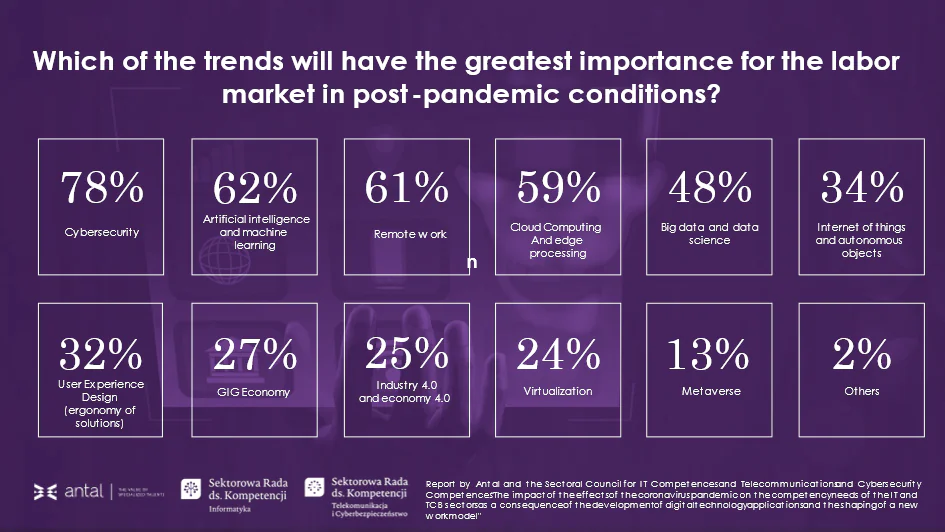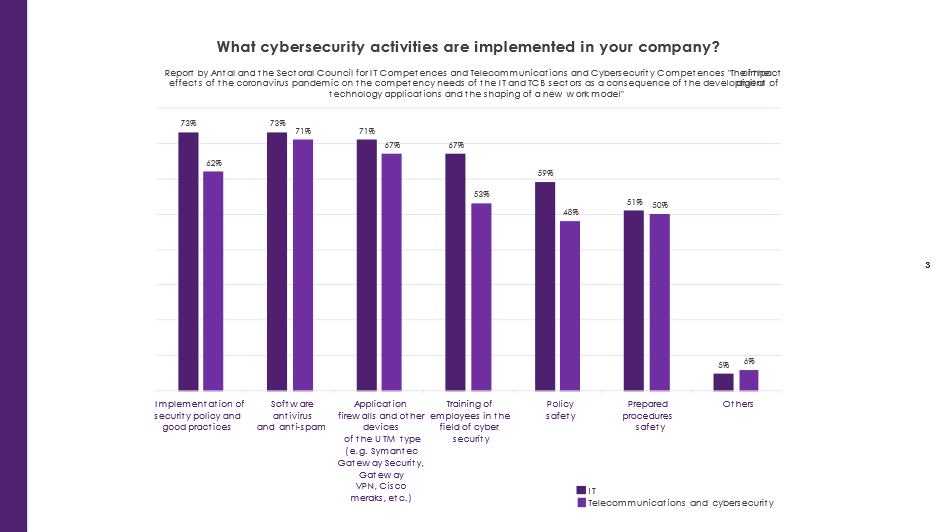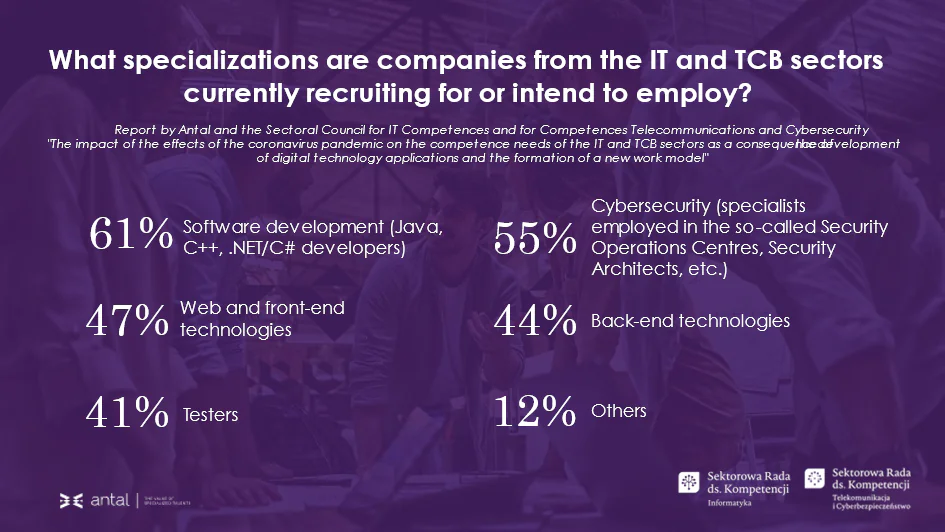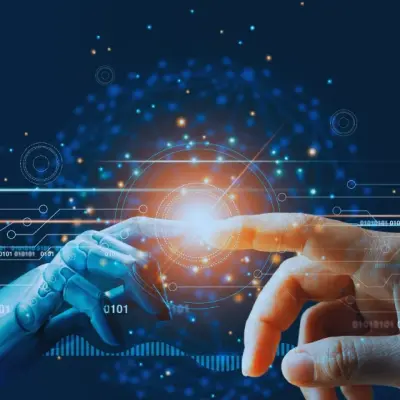Revolutions in IT and TCB - what will the key technological trends bring to the industries?
Table of contents
Due to the pandemic, almost 80% of companies declare an increased demand for tools for remote work. The current times require the use of new solutions and technologies that will ensure smooth work from anywhere in the world, as well as the security of data stored, among others, on home office computers.
As part of the activities of Antal and the Sectoral Competences Council - IT and the Sectoral Competences Council Telecommunications and Cybersecurity, the study "The impact of the effects of the coronavirus pandemic on the competency needs of the IT and TCB sectors as a consequence of the development of digital technology applications and the shaping of a new work model" was carried out (report available only in Polish). The survey covered representatives of small, medium and large companies from the IT and TCB sectors and was carried out using the CAWI and CATI method on January 16 - February 18 on a sample of 262 companies from the IT, telecommunications and cybersecurity sectors, with the principle of representativeness in individual sectors.
Digital security crucial for business in the post-COVID era
Both government and private entities today operate with countless amounts of digital data. Effective organization of work is basically impossible without the implementation of procedures related to security and effective IT systems. As many as 78% of respondents claim that digital security is the most important when it comes to post-pandemic market trends.

It is worth noting that, apart from cybersecurity, the frequency of indications regarding the most important trends between IT and TCB managers differs. In the case of IT, artificial intelligence and machine learning come to the fore, and among managers representing telecommunications and cyber security - cloud computing and edge computing. The biggest difference in indications also appears in the case of trends such as: gig economy, virtualization and metaverse - these trends are more often indicated by representatives of the telecommunications and cybersecurity sectors.
The Covid pandemic has irreversibly changed the Polish labor market and reformulated the competency needs of employees in the field of information technology (IT), telecommunications and cyber security (TCB). The coronavirus has also significantly accelerated the process of the digital revolution, which has been talked about for a long time, and the post-pandemic reality has significantly influenced the demand for new tools and technological solutions. The way and system of work has changed. Digital security should be a priority for every company, regardless of its size or industry. That is why, as part of the activities of the Sectoral Competences Council - IT and the Sectoral Competences Council Telecommunications and Cybersecurity, research was carried out, the purpose of which is, among others, indication of strategic substantive and technological areas where competence gaps in the IT and TCB sectors may occur in the near future - indicates Wiesław Paluszyński, chairman of the Sectoral Competence Council Telecommunications and Cybersecurity, president of the Polish Information Technology Society and vice-president of the Polish Chamber of Information Technology and Telecommunications.
Cyber threats in the age of digitization - how to protect yourself?
Nowadays, cyber threats are becoming an increasingly serious problem for companies. Hacker attacks, viruses and phishing are just some of the threats that enterprises have to deal with. In companies, IT representatives (73%), in connection with activities related to cybersecurity, focus on the implementation of security policies and good practices as well as anti-virus and anti-spam software - this element is in the first place among representatives of TCB companies (71%).

According to the report "The State of Security in Poland" prepared by the National Cybersecurity Institute, in 2020 the number of cyberattacks on companies and institutions in Poland increased. Theft of confidential data, disruption of IT systems, damage to the company's image or extortion of ransom - ransomware is an increasingly popular type of attack in which attackers encrypt files and demand a ransom in exchange for their unlocking - these are some of the many threats waiting for companies in cyberspace. Employers should be aware of this and prevent such events. Implementing a security policy, using antivirus software or using firewalls is a must have for a well-functioning company - adds Martyna Grunt-Mejer, Team Leader Antal, IT Services.
AI will not replace these specialists
More than half of the respondents consider the development of artificial intelligence and machine learning to be a key trend (62%). Artificial intelligence (AI) has a huge impact on the development of the IT industry, because it enables the creation and use of systems that can automate many tasks, process large amounts of data and learn and improve based on their experiences. New trends are often associated with new requirements and challenges, which are not always able to meet the existing skills of employees. This leads to the creation of competence gaps and increased demand for given specializations.

Necessary competencies closely translate into current needs or recruitment plans. There is an overwhelming demand for developers (61% of responses), cybersecurity specialists (55% of responses) and web technology experts (47% of responses). This is a continuation of the development of IT technology, which strives for maximum data security, especially now when we use mobile devices and remote access to data and services. In addition, companies also recruit business analysts, DevOps, DevSecOps, implementation specialists, integrators, IT consultants, people responsible for technical support and specialists in artificial intelligence, big data, design and project management.
According to EU data, the number of employees in the IT industry will increase from 9 million today to 20 million at the end of 2030. Figures from the World Economic Forum suggest that by 2025, 12 million more jobs will be created by automation than will be lost. Increasingly, we will have to deal with the process of retraining or upgrading qualifications in order to adapt to the requirements of new positions. For example, now popular tools such as Chat GPT or DALL-E image generator will contribute to the so-called. reskilling and upskilling of competences - comments Fabian Pietras, Business Unit Director Antal, IT Services.
About the studies
A study by Antal and the Polish Information Technology Society entitled "The impact of the effects of the coronavirus pandemic on the competence needs of the IT and TCB sectors as a consequence of the development of digital technology applications and the shaping of a new work model" was conducted as part of the activities of the Sectoral Competence Council - IT and the Sectoral Competence Council Telecommunications and Cybersecurity. The survey covered representatives of small, medium and large companies from the IT and TCB sectors and was carried out using the CAWI and CATI method on January 16 - February 18 on a sample of 262 companies from the IT, telecommunications and cybersecurity sectors, with the principle of representativeness in individual sector.
Download the report in polish: https://antal.pl/wiedza/raport/wplyw-skutkow-pandemii-koronawirusa-na-potrzeby-kompetencyjne-sektorow-informatyki-oraz-telekomunikacji-i-cyberbezpieczenstwa
A study by Antal and the Polish Information Technology Society entitled "Impact of development trends of new technologies on the competency needs of the IT sector" was conducted as part of the activities of the Sectoral Council for Competences - IT. The survey was conducted on January 19, 2023 - January 25, 2023 using the CAWI and CATI method among 202 managers of IT companies and department directors/ IT departments of non-IT companies using artificial intelligence and machine learning solutions in their operations in accordance with the PKD codes (58.2, 62, 63.1).
Download the report in polish: https://antal.pl/wiedza/raport/wplyw-trendow-rozwojowych-nowych-technologii-na-potrzeby-kompetencyjne-sektora-it
About the Sectoral Council for Competences – IT
Sectoral Competences Council - IT by initiating and participating in projects related to competency needs in the area of IT. The Sectoral Competences Council - IT helps to harmonize the educational offer with the requirements of the IT sector labor market. The Sectoral Council for Competences - IT helps to adapt the educational offer to the current requirements of the labor market in the sector, e.g. by recommending solutions/legislative changes in the field of education and its adaptation to the needs of the labor market in the sector, cooperation in the field of educational agreements aimed at integrating education and employers, defining research areas related to competences in the sector and commissioning such research, identifying needs in updating the Sectoral Qualifications Framework and creating individual qualifications, as well as providing information on the demand for competences to educational institutions, labor market institutions, including employment agencies and poviat labor offices, which should result in an increase in the effectiveness of activities in the field of job placement and vocational guidance.
About the Sectoral Competence Board Telecommunications and Cybersecurity (TCB)
The Sectoral Competence Council Telecommunications and Cybersecurity (TCB) initiates and participates in various projects related to the subject of competence in the field of telecommunications and cybersecurity. The Sectoral Competence Council Telecommunications and Cybersecurity helps adapt the educational offer to the current requirements of the labor market in the sector, e.g. by recommending legislative solutions/changes in the field of education and its adaptation to the needs of the labor market in the sector, cooperation in the field of educational agreements aimed at integrating education and employers, defining research areas related to competences in the sector and commissioning such research, as well as identifying needs to update the Sectoral Qualifications Framework and the creation of individual qualifications.














